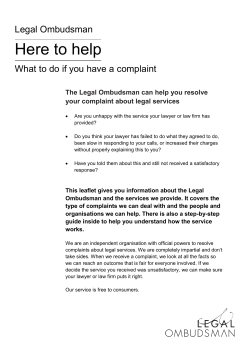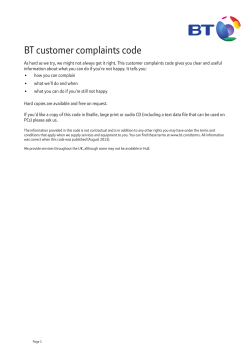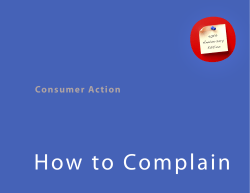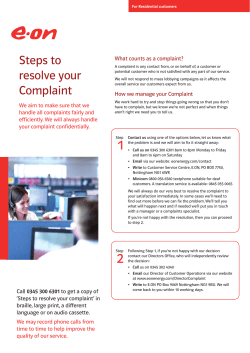
Consumer Action
Consumer Action 717 Market Street, Suite 310 San Francisco, CA 94103 e-mail: info@consumer-action.org web site: www.consumer-action.org 523 West Sixth Street, Suite 1105 Los Angeles, CA 90014 Consumer Assistance Hotline Northern California: voice: (415) 777-9635 TTY: (415) 777-9456 HOW TO COMPLAIN Southern California: voice: (213) 624-8327 e-mail: hotline@consumer-action.org Consumer Action (English version ED-I-10_EN) HOW TO COMPLAIN E veryone has consumer rights. You have the right to know what you will receive before you pay for a product or service, obtain what you pay for, complain when you are not satisfied, and get your money back when you have a legitimate complaint. There are no magical ways to get action on a complaint. Nothing will happen unless you complain and demand action. This pamphlet offers suggestions to help you get results when you have a problem with the purchase of goods or services. Before complaining R eview what happened and think about your options and rights. Consider the facts of the case, and what you want to happen. Write down: • A brief description of your complaint. • What your rights are. • Why you feel the business should do something for you. • What you want the business to do to resolve the problem. If you are not sure what your rights are, or how to proceed, contact a consumer group and discuss the situation. Talking with such an organization may help you decide how to handle the problem, and many agencies have publications that explain consumer rights and how to resolve complaints. Pay attention to all printed information you have about the case, such as: • Any ad that you responded to, or any brochure, warranty, guaran- 1 Consumer Action You can visit a small claims court before your court date. Watching other people appear before the judge could make you feel more comfortable about the process. Usually, the judge will first ask the plaintiff to speak, followed by the defendant. Then the judge will ask questions and consider the evidence. If you win your case there is no guarantee you will get your money. If the person refuses to pay, then you may have to take steps to force payment. Ask the court clerk how to do this. Credit For This Publication This pamphlet was produced by Consumer Action, a non-profit consumer education and advocacy organization. CA is located at 717 Market Street., Suite 310, San Francisco, CA 94103. Its Northern California office can be reached at 415-777-9635, from 10 a.m. to 2 p.m. PST weekdays. (TTY number: 415-777-9456.) Its Southern California office is at 213-624-8327, 10 a.m to 2 p.m. Chinese, English and Spanish spoken. While CA offers non-legal advice and referrals, it does not handle individual consumer complaints. Copyright © 1997 Consumer Action Consumer Action 14 However, most consumer cases do not involve enough money to make it worthwhile to hire a lawyer. You may not be able to locate one who is willing to help you or who is familiar with the legal issues involved. It could be many years before your case is decided by a court. If you want to speak to an attorney and don’t know how to find one, contact a lawyer referral service. (Your county’s bar association might offer such a service.) If you can’t afford an attorney, ask if your county has a legal aid agency or bar association that can help low income consumers obtain legal advice. Legal Remedies: Suing In Small Claims Court Small claims court is for the resolution of minor disputes. The rules and requirements for such courts differ widely from state to state, so the first step is to learn the rules for filing a case in your state. If you don’t know where to start, look in your phone book for a telephone number for small claims court, or ask your local government representatives where to file a case. In many states, attorneys are not allowed as representatives of either party (unless they are representing their own interests). Generally, you must file your suit in the city or county in which the company has an office or the transaction took place. There is usually a fee for filing a case. Here is some general advice about suing in small claims court: •Before you file, learn about the limitations and requirements of the small claims court. This includes the maximum amount that you can sue for, and restrictions against filing certain types of cases. •Ask the clerk of the small claims court for advice about how to file your case. If you do not file correctly, the case might be thrown out. •Give the company a chance to resolve the problem. Before you sue, notify it of your intention to sue, by sending a letter. Tell the firm why you feel it owes you money, and the specific dollar amount you want from it. tee or other document that describes the product or service and how it should work. • All letters between you and the business. • Any other papers you received from the company, including agreements, instructions, receipts and billing statements. If you signed a contract, read it carefully and ask the company for explanations of anything you don’t understand. The contract or warranty may limit your options or provide you with certain rights. Make sure you have done everything that you were supposed to do to live up to your part of the agreement. Decide what you want from the company, such as repair or replacement of the item, a refund, an exchange, a credit, a correction of the company’s records, or the payment of damages. Consider whether a compromise would be acceptable. It may be easier to resolve the complaint if you agree to a settlement that falls short of a full refund. Complain as soon as possible T he sooner you complain, the better your chances for a satisfactory settlement. In some cases, especially billing disputes, the company may not be legally liable if you fail to complain within a reasonable time after you first discover the problem or receive the bill. That is why it is important to read all bills and statements as soon as you get them. Some store refund policies allow you to return items if you do so within a few days. If you wait too long to return the item you will lose the right to get your money back. In addition, it can be difficult to defend your position if you wait a long time to complain. If you buy a television and don’t return it for three months, you may have a hard time convincing anyone that it didn’t work when you first tried to use it. •Find out the company’s legal name, and use that when suing it. •Formally notify the company of your suit. Ask the court clerk how to do this. •Prepare your case. Gather your evidence and consider whether there are witnesses who can testify on your behalf. Practice your presentation by explaining your case to friends. Ask if they can understand your position and think you are making a good case. Be clear and concise. 13 Consumer Action Consumer Action 2 How to Complain The first step in complaining is to clearly present your problem. Failure to communicate effectively often makes it difficult to resolve complaints. Have all relevant information at hand when you contact the company, including: a description of the item, your account number or other facts to help the company identify the transaction; your receipt, billing statement or cancelled check; and a clear and brief explanation of what is wrong and what you want the company to do. Do not get emotional: speak calmly and politely. Think about how the person you are speaking to will react. If you start by yelling, that person will probably get angry and begin yelling, too. Handling complaints can be a tough job. If you make the complaint handler’s job harder by getting angry, that person is likely to respond negatively to you. Make notes about all conversations you have about the complaint, including the names of everyone at the company you spoke to, when you spoke to them and what they said. You can complain by phone, in-person or by mail. As a general rule: • Phone first to tell the company about the problem and to try to resolve it. You should be able to learn with just one or two calls whether the problem will be resolved quickly. • Go to the company to return the purchase or when there is a need to meet with someone to examine the item, receipts or statements. Complaining in person helps to force the issue, but is not always necessary. If you go to the business and no one there can assist you, you will have wasted your time. Ask a friend to go with you if you are concerned about being harassed or want a witness. 3 Consumer Action Legal Remedies: Consulting A Lawyer I n many consumer complaints, the amounts involved are much too small to make it worthwhile to consult a lawyer, but contacting a lawyer can be of value in some instances: • If you are being sued you definitely need legal advice. Your failure to appear in court or obtain legal advice could be costly. Even if you know that you will lose the case, the advice of an attorney may help you to reduce the amount you will have to pay. • You may benefit from having a legal expert read or review a document. If you are about to buy a house or sign a contract, a lawyer can make sure the agreement doesn’t have clauses that could cost you money. • It can be helpful just to discuss a matter with a lawyer. If consumer agencies tell you that your only option is to sue, a lawyer can tell you the costs involved and what to expect. • In some cases, a letter from a lawyer can resolve the problem. If you have just signed a car contract after being subjected to high pressure sales tactics, a letter from a lawyer questioning such practices might convince the dealership to cancel the agreement. • Sometimes your only alternatives may be to hire a lawyer or drop the matter. If you believe your best option is to sue, but the amount is more than the small claims court limit or the case cannot be pursued in small claims court, you may have to hire a lawyer. Consumer Action 12 • Write letters as soon as you realize it will take a while to get the problem resolved. ALL PURPOSE COMPLAINT LETTER Your name Address Phone number Date Company official Company name Company address Dear Mr./Ms. Sometimes problems can be resolved with one call or visit. You may learn that you are not using the item properly, or that the company is willing to give you a refund. But when you realize that you are going to have problems with your complaint, start putting things in writing. Sometimes businesses ignore complaints until they see them in writing. Letters are important for these reasons: : I wish to complain about (name of product or service, with serial number or account number) that I purchased on (date and location of transaction). I am complaining because (the reason you are dissatisfied). To resolve this problem I would like you to (what you want the business to do). When I first learned of this problem, I contacted (name of the person, date of the call) at your company, and was told that nothing could be done about my problem. I believe that this response is unfair because (the reason you feel the company has an obligation to you). I would like a written statement explaining your company’s position and what you will do about my complaint. I look forward to hearing from you as soon as possible to resolve this problem. If I do not hear from you within 10 days I will file complaints with the appropriate consumer agencies and consider my legal alternatives. I am enclosing copies of my receipt and cancelled check. I may be contacted at the above address and phone number. • To create a written record of your complaint with the company. • To preserve your rights under law. • To make sure the business understands your side of the story. • To involve government agencies in the case or alert them to the firm’s practices. • To lay the groundwork for a future legal case or defense. • To let the company know you are serious about pursuing the matter. Complaint letters need not be long. Clearly print or type your name, address and phone number, and include your account number. If appropriate, include a copy of your cancelled check, receipt or other documents. Keep a copy of all letters you send and receive. If the first letter does not bring a response, send a second. In most cases, you do not need to send letters by certified or registered mail. However, if the company has ignored your letters or claims it never received them, consider paying for a mail receipt that will provide proof that delivery was made. Sincerely, (your signature) (also print or type your name) CC: 11 (local consumer group) (appropriate government agencies) Consumer Action Consumer Action 4 charge you interest on the amount you don’t pay if it rules against you. (You should pay the undisputed portion of the bill.) If the bank rules in your favor it will give you a credit for the money you paid on the disputed portion of the bill. If it rules against you, you can still seek a refund in court or through other actions, such as by complaining to government agencies. Tips For Writing Complaint Letters • At the top of the letter clearly print your name, address and phone number. • Note when and where the purchase or agreement took place, and any other pertinent information, such as the item’s make, model or serial number, or your account number. • Briefly and clearly describe the problem, and what you want done to resolve it. Keep records You may need certain documents in order to win your case or prove you paid for the item. These can include your receipt, cancelled checks, billing statements, repair orders and the warranty. Keep receipts and cancelled checks until you are sure you won’t need them: companies have the right to demand proof of purchase before settling a complaint or fixing an item under warranty. Never send originals of receipts or checks to the company or any complaint-handling agency—always send copies. Copies of your letters can also be very helpful. If the firm claims it never heard from you, copies of letters can document your efforts to resolve the problem. • Give a specific period of time in which a response must be received (such as 10-14 days), and indicate that you will take “further action,” “seek legal advice” or take other steps if the matter is not resolved. You need not tell the party exactly what you will do. • Note “CC” at the end of the letter if you are sending copies to anyone, such as a local consumer group or district attorney’s office. • Indicate if you are enclosing copies of supporting documents. (Never send originals.) • Keep a copy of all your letters and supporting documents. Contact someone higher up If your first attempt at complaining fails, contact someone higher up in the company. If the salesperson can’t help you, ask to speak to a supervisor or store manager, and then the owner or the company’s headquarters. Don’t hesitate to send complaint letters to the president, owner or executive offices. These officials should send your letter to the appropriate person, and may take steps to resolve the dispute promptly. Higher level officials are often more sensitive to the firm’s image, and more willing and able to exercise discretion in handling complaints. Larger companies often have “customer relations” or “consumer complaint” departments that you can contact for assistance. 5 Consumer Action Consumer Action 10 To get the name and address of the president or executive offices, call any office of the company and ask for that information. If the company refuses to provide these facts, address your envelope to the “President” and send it to any address you have for the firm. Consumer agencies often have lists of the addresses of major corporations; you may also be able to obtain such information at your library. Sometimes consumers find themselves up against a company that makes complaining very difficult. It may say, “the person you need to speak to is not in the office today, call back next week,” or “leave your number and we will get back to you.” This may be a sign that the company is stalling you. If you are not being treated seriously, it may be time to take your problem to a person higher up in the company, complain to a government agency or consider legal action. Contact government agencies Stopping payment S topping payment on a check means instructing your bank not to pay it. When you stop payment, the company you gave the check to will be unable to get any money for it—unless it was able to cash the check before you stopped payment. This is a traditional consumer remedy, but it doesn’t work in every case and it may not end the dispute. Businesses often cash checks immediately, preventing customers from stopping payment. Contact your bank as soon as possible and ask it to stop payment on the check. There will be a fee for this service of about $10-$20. The bank will not be able to guarantee that it can stop payment. Once you stop payment you should immediately tell the company (or person) to whom you gave the check what you have done and why. You can do this by phone, but you should also write a letter to create a written record of your position. (If you fail to explain the situation, the company might assume that you are trying to take the item without paying for it.) When you stop payment for a purchase you should return the item to the company. You may wish to seek advice from a consumer agency before stopping payment. Government agencies will not take on or settle your case, but some will contact the company to open up communication. For example, if you complain to the state public utilities commission about a telephone company, it might ask that company for an explanation of its position. A government banking agency might contact your bank to ask for its side of the story. District attorneys handle many cases that do not fall under the jurisdiction of any other government agency. Some district attorneys have units that offer consumer complaint mediation. No agency can force a business to settle an individual’s complaint, but the government’s interest in the case may convince the company to resolve the dispute. Businesses that ignore most complaining consumers often settle all cases that are sent to government agencies (or consumer groups or action lines). Credit card rights I f you paid by credit card, the bank that issued the card may be able to help you resolve the problem. If the item was bought in your state, and was for $50 or more, contact the bank and explain the problem. It will investigate the case and may decide in your favor if it believes you have a legitimate complaint. While it is investigating you do not have to pay the disputed amount on your credit card statement, but the bank can 9 Consumer Action Consumer Action 6 Government agencies can be excellent sources of information about consumer rights and the laws and regulations that companies must follow. If you are not sure whether a company has broken the law, call the appropriate government agency and ask for information about your rights. Many businesses are directly regulated by government agencies, such as a department of insurance or department of banking. These agencies receive complaints about the companies they regulate and investigate allegations that those businesses have violated the law. The agencies depend upon consumers to alert them to companies that are engaged in illegal practices. Even if the agency doesn’t help you resolve your complaint, it might be able to use your case to stop an unfair business practice. If your complaint involves an out-of-state company, you may still be able to obtain assistance from government agencies in your state. You can also contact a federal government agency to complain about out-of-state firms. Government agencies usually prefer that you complain by phone or mail. Most are not prepared to help people who walk into their offices without appointments. Some have special complaint forms for consumers to use. To make sure you are complaining to the appropriate agency, call it before writing, or ask a consumer group which agency to contact. When you send a complaint letter to a government agency, indicate why you are contacting it. For example, you can ask it to “Please investigate my complaint,” or “Advise me if there is a law that covers my complaint.” You don’t have to send a special letter to the agency; send it a copy of your complaint letter to the business, plus a note stating what you want the agency to do. To find the names, phone numbers and addresses of government agencies, look in the front of your White Pages telephone book. A special section in the front of most phone directories lists local, state and federal agencies. You can obtain a free publication that lists many government agencies, by writing to the Consumer Information Center, Pueblo, CO 81009, and asking for the Consumer’s Resource Handbook. 7 Consumer Action Complaining through an organization W hen you have done all you can on your own, consider whether an organization can assist you. Few consumer groups handle individual complaints, but action lines in many states help consumers to resolve problems. The entrance of a third party into a dispute raises these possibilities to the business: • The consumer is determined to see the case through, and won’t give up. • Depending on the organization, there could be bad publicity and lost business. • The consumer may be represented by people with sufficient expertise, sophistication and resources to cause problems for the business. Action lines are volunteer programs, usually run through newspapers and radio or television stations. (Callers to action lines are not placed on the air.) They give assistance to people who are having difficulty resolving complaints. They can contact a business on your behalf and try to work out a solution. To learn if there is an action line that serves your area, contact a local consumer group. Consider your alternatives If you feel you have run out of options, consider taking these steps: • Seek advice. There are many sources of information and advice. Many consumer groups and action lines offer free consultation about consumer problems. Some government agencies provide advice and information concerning complaints against the companies that they regulate. There are many publications that provide helpful suggestions about resolving consumer problems. • Sue in small claims court. Small claims is an appropriate place to settle many consumer cases. • Contact a lawyer. Usually, the money involved in consumer cases is not enough to involve a lawyer, and legal actions can take years to complete. But a lawyer can advise you about your legal rights and options. • Conduct a consumer picket. You can hand out information about your case to the public while you stand in front of the company’s store or offices, as long as you do not block traffic, break any laws or say anything in your handouts that you cannot prove. Consumer Action 8
© Copyright 2025











